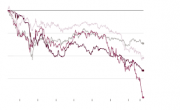Brazil, India Top 2019 Emerging Markets Political Calendar
Barron's
Jan. 4, 2019 9:00 a.m. ET
Geopolitics is top of mind for emerging-market investors at the dawn of 2019, as U.S. trade negotiators head for Beijing on Jan. 7. But national politics also loom large in other key markets. Nowhere more so than in Brazil, where capitalists’ enthusiasm for new President Jair Bolsonaro rests on the assumption that he will push through long-stymied pro-market reforms.
That won’t be easy. Bolsonaro’s Social Liberal Party controls just one-tenth of the 513 seats in the lower house of Brazil’s Congress; the rest are split among 30 other parties. And the mother of all reforms, a pension cutback that would force voters to retire in their 60s, not their 50s, requires a three-fifths majority.




